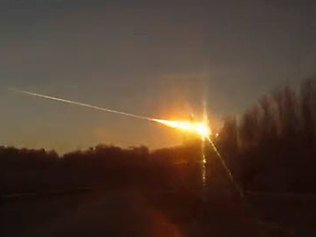
The meteor crashing in Russia’s Ural Mountains has injured at least 985 people, as the shockwave blew out windows and rocked buildings.
Most of those hurt, in the Chelyabinsk region where the meteor fell, suffered cuts and bruises but at least 46 remain in hospital.
A fireball streaked through the clear morning sky, followed by loud bangs.
President Vladimir Putin said he thanked God no big fragments had fallen in populated areas.
A large meteor fragment landed in a lake near Chebarkul, a town in Chelyabinsk region.
The meteor’s dramatic passing was witnessed in Yekaterinburg, 200 km (125 miles) to the north, and in Kazakhstan, to the south.
Officials say a large meteor partially burned up in the lower atmosphere, resulting in fragments falling earthwards.
Thousands of rescue workers have been dispatched to the area to provide help to the injured, the emergencies ministry said.
The Chelyabinsk region, about 1,500 km (930 miles) east of Moscow, is home to many factories, a nuclear power plant and the Mayak atomic waste storage and treatment centre.
One Russian politician said the event was not a meteor shower but a US weapons test, Russia’s Interfax news agency reported.

Vladimir Zhirinovsky, the leader of the ultra-nationalist Liberal Democratic Party, was quoted as saying: “Meteors are falling. Those are not meteors, it is Americans testing their new weapon.”
Chelyabinsk’s health department said 985 people had sought medical treatment, including 204 children, Interfax reported. Two people in the town of Kopeysk were in a serious condition, it added.
The governor of Chelyabinsk region, Mikhail Yurevich, was quoted elsewhere as saying 950 people had been hurt, two seriously.
Vladimir Putin promised “immediate” aid for people affected, saying kindergartens and schools had been damaged, and work disrupted at industrial enterprises.
Many children were at lessons when the meteor fell at around 09:20.
Video posted online showed frightened, screaming youngsters at one Chelyabinsk school, where corridors were littered with broken glass.
The Russian Academy of Sciences estimates that the meteor weighed about 10 tonnes and entered the Earth’s atmosphere at a speed of at least 54,000 km/h (33,000mph).
It would have shattered about 30-50km (18-32 miles) above ground, with most of the meteor burning up.
Scientists have played down suggestions that there is any link between the event in the Urals and 2012 DA14, an asteroid expected to race past the Earth on Friday at a distance of just 27,700 km (17,200 miles) – the closest ever predicted for an object of that size.
Prof. Alan Fitzsimmons, of the Astrophysics Research Centre at Queen’s University Belfast, said there was “almost definitely” no connection.
“One reason is that 2012 DA14 is approaching Earth from the south, and this object hit in the northern hemisphere,” he said.
“This is literally a cosmic coincidence, although a spectacular one.”
Such meteor strikes are rare in Russia but one is thought to have devastated an area of more than 2,000 sq km (1,250 m) in Siberia in 1908.
[youtube AGxrjXjyqj8]
[youtube wZ2XXa5oFhw]